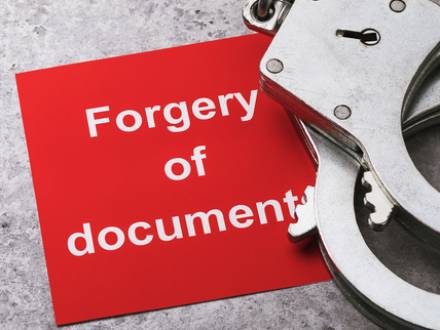What Are the Penalties for Committing Forgery in Texas?
 Are you or someone you know facing forgery charges in Texas? The situation is serious, and the consequences can be life-changing. Forgery accusations in Texas are not taken lightly by law enforcement or the courts. A conviction could mean jail time, hefty fines, and a criminal record that follows you for years.
Are you or someone you know facing forgery charges in Texas? The situation is serious, and the consequences can be life-changing. Forgery accusations in Texas are not taken lightly by law enforcement or the courts. A conviction could mean jail time, hefty fines, and a criminal record that follows you for years.
But what exactly counts as forgery in Texas? What penalties might you be facing? And most importantly, what can you do to protect your rights and future? A Texas lawyer can help you figure out what you should do in your specific situation.
What is Considered Forgery in Texas?
In Texas, forgery covers various deceptive actions involving documents. It includes creating, altering, or using a false document with the intent to defraud or harm another person. This can take many forms, from putting someone else’s signature on a check to altering the amount on a financial document.
Other common examples include creating fake identification cards or falsifying academic transcripts and diplomas. Texas law takes a hard stance on forgery because it undermines the trust that is essential for important documents and transactions. Forgery can inflict significant financial harm on individuals and businesses, disrupting lives and damaging the economy. Understanding what constitutes forgery is important, as even minor alterations to documents can lead to serious legal consequences if done with fraudulent intent.
Penalties for Forgery in Texas
The penalties for forgery in Texas depend on the type of document forged and the specific circumstances of the crime. There are different categories of forgery offenses with associated penalties.
Class A Misdemeanor Forgery
This is the least severe forgery charge, but it still carries serious penalties:
-
Up to one year in county jail
-
A fine of up to $4,000
-
Both jail time and a fine
Class A misdemeanor forgery typically involves forging or altering a document that is not specifically listed in higher-level forgery statutes.
State Jail Felony Forgery
Forging certain types of documents is considered a state jail felony:
-
180 days to two years in a state jail facility
-
A fine of $10,000 or more
-
Or both a fine and jail time
This level applies to forging many common documents, such as wills, deeds, mortgages, credit cards, and checks.
Third-Degree Felony Forgery
The most serious forgery offenses are third-degree felonies:
-
Two to 10 years in state prison
-
A fine of up to $10,000
-
Or both prison time and a fine
This level typically involves forging government documents like money, stamps, or official seals.
Additional Consequences of a Forgery Conviction
Beyond fines and jail time, a forgery conviction can have long-lasting effects:
-
A permanent criminal record
-
Difficulty finding employment, especially in fields involving finance or trust
-
Loss of professional licenses
-
Challenges in obtaining loans or housing
-
Potential immigration consequences for non-citizens
These far-reaching impacts make it crucial to take forgery charges seriously and seek experienced legal representation.
Potential Defenses Against Forgery Charges
If you are facing forgery charges in Texas, it is vital to understand your rights and options. An attorney can help by:
-
Examining the evidence against you
-
Identifying potential weaknesses in the prosecution’s case
-
Exploring possible defenses, such as lack of intent to defraud
-
Negotiating with prosecutors for reduced charges or penalties
Every forgery case is unique, and the best defense strategy depends on the specific facts and circumstances involved.
Contact a Cooke County, TX Criminal Defense Lawyer
Do not let forgery charges threaten your future. A Denton County, TX criminal defense lawyer can help protect your rights and freedom. Call Magaña & Van Dyke at 940-382-1976 today to schedule your confidential case evaluation and take the first step toward building a strong defense against forgery charges.





